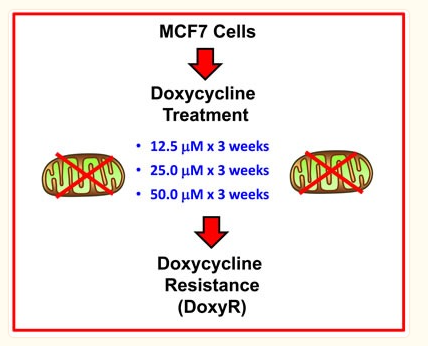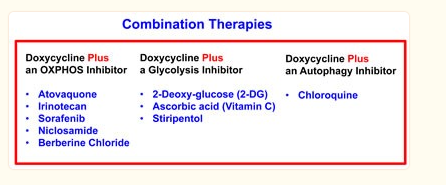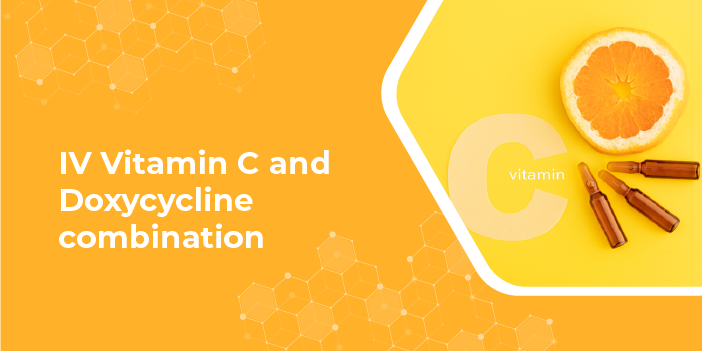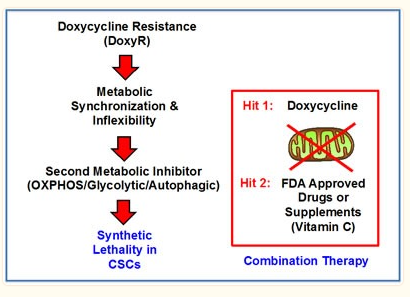High-Dose Intravenous Vitamin C and Doxycycline combination: lethal to cancer stem cells
Cancer stem cells are the major cause that helps the tumor in progression, metastasis, and recurrence, and make the tumors resistant to therapies available. So, eradicating these cancer stem cells CSCs can be a very important therapy in preventing cancers. A high mitochondrial mass is observed through different findings in CSCs and high levels of mitochondrial proteins. So, these can be targeted by using different drugs to stop the progression of tumors.
Vitamin C in cancer
Vitamin C is a natural product that is consumed along with many other dietary components. It is also taken as a synthetic molecule available in the market. Vitamin C boosts the body’s immune system and also acts as a coenzyme in many of the important biochemical processes that are required for proper body functioning.
Vitamin C is found to be very effective in cancer treatments as it targets the tumor cells, killing them, by different mechanisms of action. Vitamin C is given orally as well as injected intravenously into the body of a cancer patient. It is found that intravenous injection is more effective as compared to oral intake of similar concentrations.
Vitamin C targets the energy production processes in the tumor cells by binding the glucose transporter proteins in these cells. Cancer cells depend solely on glycolysis for the production of energy. These cells cannot go for oxidative phosphorylation for producing ATP although a large amount of energy is produced by this pathway it requires more time for the movement of glucose to the mitochondria for oxidative phosphorylation. So, cancer cells prefer glycolysis over OXPHOS even in the presence of oxygen ( et al., 2021).
When vitamin C is injected into the tumor cells, it binds the glucose transporters, and so transporters become limited for binding glucose although glucose is available in the environment. When glucose cannot bind transporters, it is unable to move into the cells. So, cells cannot get enough glucose for glycolysis, and hence become deprived of energy and will not be able to perform basic survival activities. As a result, cells will die.
Moreover, vitamin C degrades the hypoxia-inducible factor 1 HIF-1 in the tumor cells. This is the main factor that helps the tumor cells survive under low oxygen conditions. After the degradation of HIF-1, tumor cells will not be able to survive and are killed.
Vitamin C has the ability to induce apoptosis in the tumor cells to reduce tumor progression. It induces oxidative stress in the cells by disturbing the balance of the ROS reactive oxygen species. The cells can not cope with the stress and are killed by apoptosis.
Vitamin C brings the copper from the extracellular environment into the tumor cells, electron transfer takes place from the copper to vitamin C which will result in the formation or production of ROS in the cell, creating oxidative stress and resulting in cell death.
So, these are some of the important mechanisms based on which vitamin C is proven to be effective against cancer cells. Older patients who are at the end stage of cancer have been found to be very low in vitamin C although vitamin C is a very important antioxidant in the body. But due to the absence of vitamin C, the immune system of cancer patients cannot help in fighting against cancer.
Doxycycline
It is an FDA-approved drug that is being used for treating cancers. It plays an important role in eradicating the cancer stem cell’s CSCs by targeting cellular respiration through mitochondrial proteins. As cancer stem cells have a high mass of mitochondria and mitochondrial proteins, targeting these proteins can be effective in eradicating the cancer stem cells and in fact stopping the progression of tumors (Peaslee et al., 2021).
MT-ND3, MT-CO2, MT-ATP6, and MT-ATP8 are the mitochondrial proteins that are found to be targeted by antibiotic doxycycline. Experimental findings have shown that the use of this antibiotic reduces the expression of these proteins by 35 folds (Scatena et al., 2018).
Many cancer patients are treated with radiation therapy that is usually given after the surgery to prevent tumor recurrence. But the cancer cells often become resistant to this treatment and repair the damage caused by ionizing radiation, so the tumor recurs. Doxycycline is also being given to such patients as it has a strong radio-sensitizer activity and prevents tumor recurrence and resistance against radiation therapy in patients (Scatena et al., 2018).

Limitation of doxycycline
Although doxycycline is targeting the respiratory pathway through mitochondria in the cancer stem cells, experiments have shown that the cancer cells become resistant to doxycycline antibiotics by reverting to glycolysis completely. Hence, doxycycline alone is not as significant, we should use some glycolytic inhibitor along with it for more effective results.
Vitamin C and Doxycycline
As mentioned above, vitamin C targets the glycolytic pathway in the cancer cells while doxycycline has a role in targeting the mitochondrial proteins of the cancer stem cells. So, if both of these therapies are used in combination, the glycolytic pathway and mitochondria of the tumor cells will be targeted concurrently resulting in more significant outcomes.
As doxycycline resistance is found to be developed in cancer cells, by cell reversion to glycolysis. So, when vitamin C is given to the tumors along with doxycycline, their mitochondrial respiratory pathway and glycolytic pathways will be inhibited at the same time. So, there will be no chance of survival (De Francesco et al., 2017).
Experimental Findings
Experiments were performed on MCF7 breast cancer cell lines to check the outcomes of combinational therapy in which vitamin C and doxycycline are concurrently injected into the cancer stem cells.
Some cells in the culture were given only vitamin C, some were given just doxycycline, while others were given both vitamin C and doxycycline. It was observed that tumor reduction occurred in all the cases, but the most significant results were observed in the cell lines that were given combinational therapy (Satheesh et al., 2020).
Doxycycline targets the mitochondria of cancer stem cells; this will revert the cancer cells to move toward glycolysis for energy production instead of oxidative phosphorylation. But when vitamin C is also given, it will target the glycolytic pathway of these cells by binding the glucose transporters and limiting the movement of glucose in the cancer cells. The cells become highly deprived of energy as both the energy-producing pathways are disturbed and will be ultimately killed. So, the use of doxycycline and vitamin C in combination against cancer cells can have more effective outcomes than conventional therapies or individual therapies (* , 1,3, n.d.).

Conclusion
Doxycycline is an FDA-approved antibiotic that is being given to cancer patients and targets the mitochondrial proteins in cancer stem cells CSCs. When the respiratory pathway is targeted, the CSCs cannot survive, but it is observed that the CSCs develop resistance to doxycycline by reverting to the glycolytic pathway for energy production.
Vitamin C targets the glycolysis process in CSCs and when it is given in combination with doxycycline, both the energy-producing pathways of cancer cells are disrupted, resulting in the killing of cancer cells. So, this combination therapy can have significant outcomes if given to cancer patients.
References
* , 1,3. (n.d.). 1–33.
De Francesco, E. M., Bonuccelli, G., Maggiolini, M., Sotgia, F., & Lisanti, M. P. (2017). Vitamin C and Doxycycline: A synthetic lethal combination therapy targeting metabolic flexibility in cancer stem cells (CSCs). Oncotarget, 8(40), 67269–67286. https://doi.org/10.18632/ONCOTARGET.18428
Hashim, H., Maulood, M., Ali, C., Rasheed, A., Fatak, D., Kabah, K., & Abdulamir, A. (2021). Controlled Randomized Clinical Trial on Using Ivermectin with Doxycycline for Treating COVID-19 Patients in Baghdad, Iraq. Iraqi Journal of Medical Sciences, 19(1), 107–115. https://doi.org/10.22578/ijms.19.1.14
Peaslee, C., Esteva-Font, C., Su, T., Munoz-Howell, A., Duwaerts, C. C., Liu, Z., Rao, S., Liu, K., Medina, M., Sneddon, J. B., Maher, J. J., & Mattis, A. N. (2021). Doxycycline Significantly Enhances Induction of Induced Pluripotent Stem Cells to Endoderm by Enhancing Survival Through Protein Kinase B Phosphorylation. Hepatology, 74(4), 2102–2117. https://doi.org/10.1002/hep.31898
Satheesh, N. J., Samuel, S. M., & Büsselberg, D. (2020). Combination therapy with vitamin C could eradicate cancer stem cells. Biomolecules, 10(1). https://doi.org/10.3390/biom10010079
Scatena, C., Roncella, M., Di Paolo, A., Aretini, P., Menicagli, M., Fanelli, G., Marini, C., Mazzanti, C. M., Ghilli, M., Sotgia, F., Lisanti, M. P., & Naccarato, A. G. (2018). Doxycycline, an inhibitor of mitochondrial biogenesis, effectively reduces cancer stem cells (CSCs) in early breast cancer patients: A clinical pilot study. Frontiers in Oncology, 8(OCT). https://doi.org/10.3389/fonc.2018.00452

